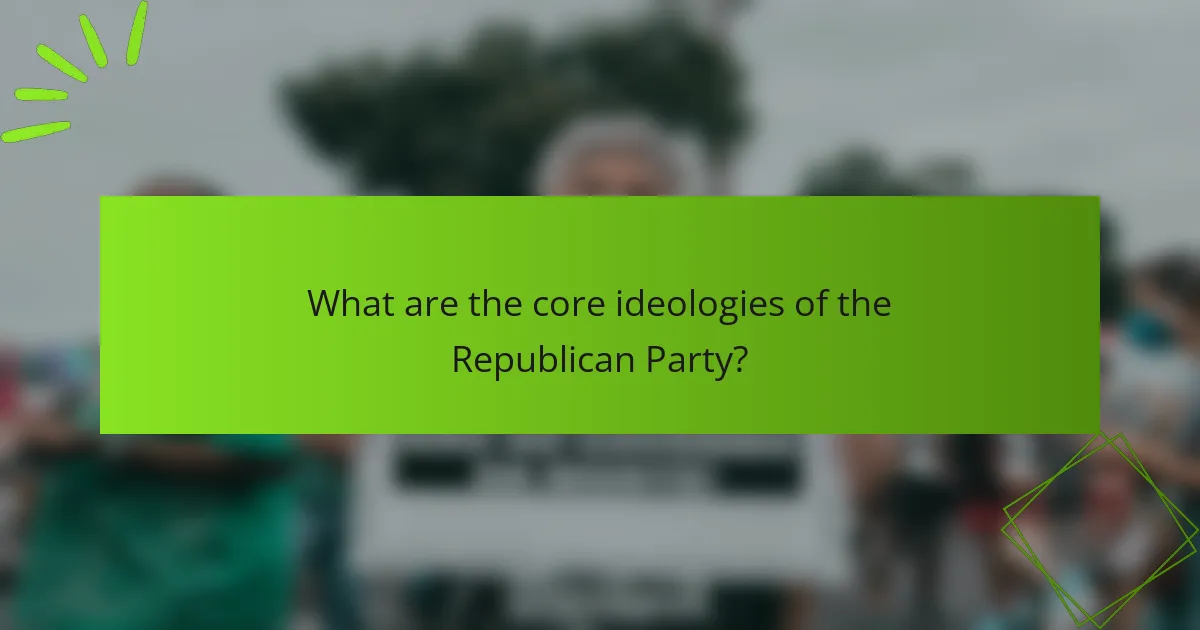The Republican Party is characterized by core ideologies that include limited government, individual liberties, free-market capitalism, and traditional values. These ideologies influence the party’s policies and electoral strategies, which encompass grassroots mobilization, demographic targeting, and digital campaigning. The intersection of these core beliefs with electoral tactics shapes voter engagement and campaign messaging, particularly on issues such as taxation, healthcare, and immigration. Historical evidence highlights the effectiveness of these strategies, demonstrating their role in the party’s electoral successes in key battleground states.

What are the core ideologies of the Republican Party?
The core ideologies of the Republican Party include limited government, individual liberties, free-market capitalism, and traditional values. Limited government emphasizes reducing the size and influence of federal agencies. Individual liberties focus on personal freedoms and rights, often advocating for less regulation. Free-market capitalism promotes minimal government intervention in the economy, believing that this leads to prosperity. Traditional values often reflect conservative social beliefs, including family and religious principles. These ideologies have shaped the party’s policies and electoral strategies over time. For instance, the party’s support for tax cuts aligns with its free-market stance, while its opposition to certain social policies reflects its commitment to traditional values.
How do these ideologies shape the party’s identity?
Ideologies shape the Republican Party’s identity by defining its core principles and values. These ideologies emphasize limited government, individual liberties, and free-market capitalism. They create a framework for policy-making and voter engagement. The party’s identity is reinforced through consistent messaging around these beliefs. Historical events, such as the Reagan era, exemplify the impact of these ideologies on party unity and electoral success. For instance, tax cuts and deregulation became hallmarks of the party’s platform. Additionally, social conservatism influences the party’s stance on issues like family values and religious freedom. This ideological foundation helps distinguish the party from its competitors. Overall, these ideologies shape the Republican Party’s identity by providing a cohesive narrative that resonates with its base.
What are the foundational beliefs that define the Republican Party?
The foundational beliefs that define the Republican Party include limited government, individual liberties, free-market capitalism, and a strong national defense. Limited government emphasizes reducing the size and scope of government. Individual liberties focus on personal freedoms and rights. Free-market capitalism advocates for minimal government intervention in the economy. A strong national defense prioritizes military strength and national security. These beliefs are rooted in the party’s historical context and have evolved over time. For example, the party’s commitment to economic freedom has been a consistent theme since its founding in the 1850s. Additionally, the Republican Party often emphasizes traditional values, fiscal responsibility, and a belief in personal responsibility.
How do economic principles influence Republican ideology?
Economic principles significantly influence Republican ideology by emphasizing free markets and limited government intervention. Republicans advocate for lower taxes to stimulate economic growth. They believe that reducing regulations encourages business expansion and job creation. The party often supports fiscal conservatism, aiming to reduce government spending. This approach is rooted in the belief that a smaller government fosters individual entrepreneurship. Historical evidence shows that Republican administrations have prioritized tax cuts, such as the Tax Cuts and Jobs Act of 2017. This act aimed to boost the economy by lowering corporate tax rates. Additionally, economic principles drive Republican stances on trade, favoring policies that promote American businesses. Overall, economic ideologies shape Republican strategies and positions on various issues.
What role does conservatism play in Republican ideologies?
Conservatism is central to Republican ideologies. It emphasizes limited government, individual liberties, and free-market principles. Conservatism shapes the party’s stance on fiscal policy, advocating for lower taxes and reduced government spending. Social conservatism influences views on family values and traditional norms. Historically, conservative movements within the party have mobilized voters around issues like gun rights and religious freedom. The alignment with conservative principles has helped the Republican Party maintain a strong base among certain demographics. Key figures, such as Ronald Reagan, have solidified conservatism’s role in the party’s identity. Overall, conservatism is a foundational element that drives the Republican Party’s policies and electoral strategies.
How does social conservatism manifest within the party?
Social conservatism manifests within the Republican Party through its emphasis on traditional values, family structures, and religious beliefs. The party advocates for policies that reflect these values, such as opposition to abortion and same-[censured] marriage. Many Republican platforms include calls for the promotion of religious freedom and the protection of parental rights in education. Social conservatism also influences the party’s stance on issues like immigration, where traditional family units are often highlighted. This ideological framework is supported by influential organizations, such as the Family Research Council and the Heritage Foundation, which promote social conservative policies. Voter demographics show that social conservatives make up a significant portion of the Republican base, influencing electoral strategies and candidate selections.
What are the key tenets of fiscal conservatism?
Fiscal conservatism emphasizes limited government spending and low taxes. It advocates for balanced budgets to avoid deficits. Fiscal conservatives prioritize reducing national debt and government intervention in the economy. They support free-market principles, believing that less regulation fosters economic growth. This ideology often includes cutting social welfare programs to reduce government size. Historical examples include the Reagan administration, which implemented significant tax cuts. Fiscal conservatism aims to promote individual responsibility and economic freedom. It is rooted in the belief that a smaller government leads to a more prosperous society.
How do Republican ideologies address social issues?
Republican ideologies address social issues by emphasizing individual responsibility, traditional values, and limited government intervention. These ideologies often advocate for personal choice in areas such as education and healthcare. Republicans typically support policies that promote family structures and community involvement. They often focus on law and order, advocating for strong measures against crime and drug abuse. Additionally, Republican platforms frequently prioritize religious freedom and the protection of Second Amendment rights. Evidence of these positions can be seen in legislative actions and party platforms that reflect conservative values. For example, the Republican Party’s 2020 platform highlighted the importance of family and the need for parental rights in education.
What is the party’s stance on healthcare and education?
The Republican Party advocates for a market-driven approach to healthcare and education. They emphasize reducing government involvement in these sectors. The party supports private sector solutions to improve efficiency and lower costs. In healthcare, they often propose repealing the Affordable Care Act. Republicans argue that competition among providers enhances quality and accessibility. For education, they favor school choice initiatives, including charter schools and vouchers. This approach aims to empower parents and increase educational options for students. Their stance reflects a belief in personal responsibility and limited government intervention.
How does the Republican Party approach immigration policy?
The Republican Party approaches immigration policy with a focus on border security and enforcement. They advocate for stricter immigration laws and measures to prevent illegal immigration. This includes support for building barriers along the U.S.-Mexico border. The party emphasizes the need for a merit-based immigration system. They argue that such a system prioritizes skilled workers. Many Republican leaders also oppose sanctuary cities that limit cooperation with federal immigration authorities. The party believes in enforcing existing immigration laws more rigorously. Their policies often reflect concerns about national security and economic impact. These positions are shaped by a significant voter base that prioritizes immigration control.

What electoral strategies does the Republican Party employ?
The Republican Party employs various electoral strategies to secure votes. These strategies include grassroots mobilization, targeting specific demographics, and utilizing digital campaigning. Grassroots mobilization involves engaging local volunteers to connect with voters directly. Targeting specific demographics often focuses on appealing to white working-class voters and suburban women. Digital campaigning utilizes social media platforms to reach younger voters and disseminate tailored messages. The party also emphasizes strong messaging on issues like the economy and national security. Historical data shows that these strategies have contributed to significant electoral successes, particularly in key battleground states during recent elections.
How does the party target specific voter demographics?
The Republican Party targets specific voter demographics through tailored messaging and strategic outreach. They analyze demographic data to identify key voter groups. This includes age, ethnicity, and socioeconomic status. The party employs targeted advertising on social media platforms to reach these groups effectively. They also organize events and town halls in areas with high concentrations of their target demographics. Additionally, the party emphasizes issues that resonate with specific groups, such as tax cuts for middle-class families. Voter registration drives are conducted in communities that align with their values. This approach has proven effective in mobilizing support during elections.
What strategies are used to engage suburban voters?
Engaging suburban voters involves targeted communication, community outreach, and tailored policy messaging. Campaigns utilize door-to-door canvassing to establish personal connections. They also leverage social media platforms to disseminate information and engage in discussions. Hosting local events allows candidates to address community concerns directly. Surveys and focus groups help identify key issues important to suburban demographics. Emphasizing policies on education, public safety, and taxes resonates well with these voters. Data from the 2020 election indicates that suburban areas were pivotal in determining electoral outcomes.
How does the party appeal to rural constituencies?
The Republican Party appeals to rural constituencies through policies that prioritize agricultural interests and economic growth. They advocate for reduced regulations that benefit farmers and promote local businesses. The party emphasizes traditional values, which resonate with many rural voters. They often focus on issues like gun rights, which are significant in rural areas. The party also supports tax cuts, aiming to increase disposable income for rural families. Additionally, they promote infrastructure development to enhance connectivity in rural regions. These strategies are reinforced by outreach efforts, including town hall meetings and community events.
What role does campaign financing play in Republican electoral strategies?
Campaign financing is crucial for Republican electoral strategies as it enables candidates to effectively compete in elections. Funding allows for extensive advertising, outreach, and mobilization efforts. In 2020, Republican candidates raised approximately $1.1 billion for congressional races. This financial support helps candidates amplify their messages and reach wider audiences. Additionally, large donations from individuals and organizations can significantly influence campaign viability. Republican strategies often focus on securing contributions from high-net-worth donors and corporate interests. This approach provides a competitive edge in key battleground states. Overall, campaign financing directly impacts the Republican Party’s ability to execute its electoral strategies successfully.
How do Super PACs influence Republican campaigns?
Super PACs influence Republican campaigns by providing significant financial support. They can raise unlimited sums of money from individuals, corporations, and unions. This allows them to spend heavily on advertising and outreach efforts. For example, Super PACs played a crucial role in the 2016 Republican primaries. They helped candidates like Donald Trump and Ted Cruz amplify their messages. According to the Center for Responsive Politics, Super PACs spent over $1 billion in the 2020 election cycle. This financial power can sway public opinion and voter turnout. Ultimately, Super PACs shape the competitive landscape of Republican campaigns.
What are the implications of donor contributions for party strategy?
Donor contributions significantly influence party strategy by shaping funding priorities and campaign tactics. These contributions enable parties to allocate resources towards key electoral districts. High-value donors often expect alignment with their interests, prompting parties to adopt specific policy positions. This can lead to a focus on issues that resonate with wealthy contributors rather than the broader electorate. For instance, in the 2020 election cycle, major Republican donors prioritized tax cuts and deregulation. Consequently, party platforms may reflect these priorities to secure ongoing financial support. Additionally, substantial contributions can enhance a party’s visibility and outreach efforts, impacting voter engagement strategies. Overall, donor contributions are a critical factor in determining a party’s strategic direction and policy focus.
How does the Republican Party utilize media and technology in campaigns?
The Republican Party utilizes media and technology to enhance campaign outreach and engagement. They employ social media platforms to connect with voters directly. This strategy allows for targeted messaging to specific demographics. The party also uses data analytics to optimize campaign strategies. By analyzing voter behavior, they tailor their communications effectively. Additionally, they invest in digital advertising to reach broader audiences. The use of email marketing helps mobilize supporters and drive donations. In the 2020 election, the Republican Party significantly increased its digital presence. This approach resulted in higher engagement rates compared to previous campaigns.
What digital strategies are effective for reaching younger voters?
Effective digital strategies for reaching younger voters include leveraging social media platforms and creating engaging content. Social media is where younger voters spend significant time. Platforms like Instagram, TikTok, and Snapchat are particularly popular among this demographic.
Targeted advertising on these platforms can increase visibility. Campaigns should focus on issues important to younger voters, such as climate change and student debt. Interactive content, like polls and quizzes, can boost engagement.
Utilizing influencers to spread messages can also enhance reach. Research indicates that 70% of younger voters trust influencers over traditional advertising. Email campaigns tailored to younger audiences can provide valuable information and mobilize support.
In summary, effective strategies involve social media engagement, targeted ads, and influencer partnerships.
How do traditional media platforms factor into Republican messaging?
Traditional media platforms play a crucial role in shaping Republican messaging. They serve as primary channels for disseminating the party’s narratives and policies. Television, radio, and print media are instrumental in reaching a broad audience. These platforms help frame issues in ways that resonate with Republican values. For instance, conservative talk radio has been pivotal in mobilizing grassroots support. Studies show that media coverage influences public perception of political issues. Republican candidates often utilize traditional media for strategic advertising. This approach helps to establish a recognizable presence among voters. Overall, traditional media remains a vital component of the Republican Party’s communication strategy.

How do core ideologies and electoral strategies intersect?
Core ideologies and electoral strategies intersect by influencing voter engagement and campaign messaging. The Republican Party’s core ideologies, such as conservatism and individualism, shape its electoral strategies. These ideologies guide the party’s stance on issues like taxation, healthcare, and immigration. For example, a commitment to lower taxes is a core ideological belief that informs campaign promises. This alignment helps to attract voters who prioritize economic freedom. Additionally, electoral strategies often leverage ideological themes to mobilize grassroots support. Historical evidence shows that during the 1980 Reagan campaign, conservative ideologies were pivotal in rallying voter turnout. This intersection ultimately defines the party’s identity and electoral success.
In what ways do ideologies inform the party’s campaign messaging?
Ideologies shape the Republican Party’s campaign messaging by defining core values and guiding principles. These ideologies emphasize limited government, individual liberties, and free-market economics. Campaign messages often reflect these themes to resonate with voters. For instance, promoting tax cuts aligns with the ideology of economic freedom. Additionally, messaging around personal responsibility is rooted in conservative beliefs. The party utilizes ideological frameworks to address social issues, such as advocating for traditional family values. Overall, ideologies provide a consistent narrative that unifies campaign strategies and appeals to the party’s base.
How does the party’s stance on issues resonate with voters during elections?
The party’s stance on issues significantly influences voter alignment during elections. Voters often prioritize issues that resonate with their personal beliefs and experiences. For example, Republican positions on taxes and economic growth appeal to voters who favor lower taxes and free-market policies. According to a 2020 Pew Research study, 61% of Republicans believe that tax cuts spur economic growth. Additionally, the party’s stance on social issues, such as gun rights and immigration, can mobilize its base. A Gallup poll indicated that 63% of Republicans support stricter immigration controls. These positions create a strong connection between the party and its voter base, impacting electoral outcomes.
What examples illustrate the alignment of ideology and strategy in recent campaigns?
Recent campaigns by the Republican Party illustrate the alignment of ideology and strategy through grassroots mobilization and messaging focused on economic conservatism. For example, the 2022 midterm elections featured candidates emphasizing tax cuts and deregulation, resonating with the party’s core belief in limited government. Additionally, the use of social media platforms to spread messages about traditional family values aligned with their ideological stance on social issues. The “America First” policy approach during the 2020 presidential campaign also showcased a strategic alignment with nationalist sentiments among voters. These strategies were supported by data showing that voters prioritized economic stability and cultural identity.
What challenges does the Republican Party face in maintaining ideological consistency?
The Republican Party faces challenges in maintaining ideological consistency due to internal divisions. These divisions arise from differing views on key issues such as immigration, healthcare, and fiscal policy. The rise of populism within the party complicates traditional conservative values. Additionally, varying regional priorities lead to conflicting policy stances. The influence of special interest groups further exacerbates these inconsistencies. Historical shifts, such as the Tea Party movement, have also changed the party’s ideological landscape. These factors create a dynamic environment where maintaining a unified ideology is increasingly difficult.
How do internal divisions affect electoral strategies?
Internal divisions significantly impact electoral strategies by creating factions within a party. These factions may have differing priorities and ideologies, leading to conflicting campaign messages. This can confuse voters and dilute the party’s overall message. Additionally, internal divisions can weaken party unity, making it challenging to mobilize resources effectively. For instance, during the 2016 Republican primaries, divisions between establishment candidates and grassroots movements influenced campaign strategies and voter turnout. Such divisions can also lead to primary challenges, diverting attention and resources away from general election campaigns. Ultimately, internal divisions can hinder a party’s ability to present a cohesive front, reducing its competitiveness in elections.
What are the implications of shifting voter preferences on party ideology?
Shifting voter preferences can significantly alter party ideology. When voters express changing priorities, parties may adapt their platforms to align with these new preferences. This adaptation can lead to a redefinition of core values and policy positions. For instance, if a significant portion of the electorate prioritizes climate change, a party may shift to incorporate more environmental policies. Historical examples include the Democratic Party’s move towards progressive social issues in response to changing voter sentiments in the late 20th century. Such shifts can also create internal divisions within a party, as factions may disagree on the direction of ideology. Furthermore, failure to adapt may result in decreased electoral support, as seen in recent elections where parties lost ground due to ignoring voter concerns. Overall, the implications of shifting voter preferences compel parties to remain responsive and dynamic in their ideological stances.
What best practices can the Republican Party adopt for future elections?
The Republican Party can adopt several best practices for future elections. First, they should focus on grassroots mobilization. Engaging local communities can increase voter turnout. Second, enhancing digital outreach is crucial. Utilizing social media effectively can reach younger voters. Third, promoting a clear and unified message is essential. Consistency in communication builds trust among constituents. Fourth, prioritizing candidate training can improve public speaking and debate skills. Well-prepared candidates are more effective in conveying their platforms. Fifth, the party should analyze data-driven strategies. Understanding voter demographics can tailor campaign efforts. Lastly, fostering inclusivity within the party can attract diverse voter bases. Embracing varied perspectives can strengthen overall support.
The Republican Party is defined by its core ideologies, which include limited government, individual liberties, free-market capitalism, and traditional values. These principles shape the party’s identity and influence its electoral strategies, including grassroots mobilization and targeted outreach to specific demographics. The article explores how these ideologies inform the party’s stance on various issues such as healthcare, immigration, and fiscal policy, as well as the impact of campaign financing and media strategies on electoral success. Additionally, it addresses the challenges the party faces in maintaining ideological consistency amid shifting voter preferences and internal divisions.
